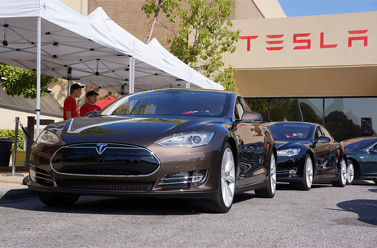
Tesla (TSLA) stock has had a rough start to 2024, falling more than 35%. It's now down nearly 50% from its 52-week intraday high of $299.29 reached back in July 2023. What's causing the weakness?
The decline in Tesla's stock has been caused by multiple factors, including a top- and bottom-line miss in its fourth-quarter earnings release and very weak first-quarter delivery results.
Tesla's stock took a hit earlier this year following weaker-than-expected earnings results for the fourth quarter, in which its revenue grew just 3% year-over-year.
The situation has seemingly not improved to start the new year, with Tesla recently reporting its quarterly deliveries declined for the first time in nearly four years, according to Reuters. The company will unveil its full first-quarter results after the April 23 close.
Amid the issues Tesla has been facing, the company announced earlier this week that it will lay off more than 10% of its global workforce.
"As we prepare the company for our next phase of growth, it is extremely important to look at every aspect of the company for cost reductions and increasing productivity," Tesla CEO Elon Musk said in a company-wide email obtained by Electrek. "As part of this effort, we have done a thorough review of the organization and made the difficult decision to reduce our headcount by more than 10% globally. There is nothing I hate more, but it must be done. This will enable us to be lean, innovative and hungry for the next growth phase cycle."
Following the report of layoffs, two Tesla executives, Drew Baglino and Rohan Patel, announced departures on X, the platform formerly known as Twitter.
The layoff report comes less than two weeks after Elon Musk posted that Tesla would unveil its highly-anticipated robotaxi on August 8. The robotaxi launch is the key driver of Ark Invest CEO Cathie Wood's $2,000 price target on Tesla.
"With a robotaxi platform, Tesla should be able to generate earnings from both the vehicle sale and a recurring ride-hail revenue stream, which ARK believes could generate software-like margins," Ark said in its valuation model. "As Elon Musk has phrased it, autonomous ride-hail 'probably will be the biggest asset value increase in history.'"
What is the takeaway for investors?
While the issues facing Tesla are not insignificant, they are near-term headwinds. The robotaxi launch, expanded adoption of its full self-driving (FSD) technology and expansion of its electric vehicle (EV) charging infrastructure are what will likely drive the stock over the long term, so investors must evaluate their risk appetite to determine if they want to stick around to watch it all play out or move on.
Analysts are currently on the sidelines. The consensus estimate of those following the stock tracked by S&P Global Market Intelligence is currently a Hold. Still, their average price target of $192.72 represents implied upside of about 23% from today's levels.







